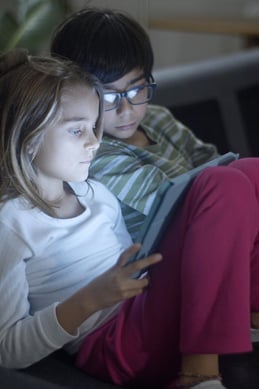The Impact of Excessive Screen Time on Children's and Adolescents' Mental Health
The Impact of Excessive Screen Time on Children's and Adolescents' Mental Health. Explore how too much screen time affects the mental health of children and teens.
Health Is Life
1/22/20251 min read
In the digital age, screens are an integral part of children’s and adolescents’ lives, from education to entertainment. However, excessive screen time has raised concerns about its impact on their mental health. Below, we outline the potential effects, contributing factors, and strategies to mitigate harm.
Negative Effects of Excessive Screen Time:
Increased Anxiety and Depression: High screen use is linked to symptoms of anxiety and depression.
Sleep Disruptions: Prolonged exposure to screens, especially before bed, can interfere with sleep quality.
Social Isolation: Excessive time on devices reduces face-to-face interactions, impacting social skills.
Decreased Attention Span: Overstimulation from screens may contribute to difficulty focusing.
Exposure to Cyberbullying: Social media use increases the risk of online harassment.
Factors Contributing to Mental Health Issues:
Content Consumption: Violent or negative content can heighten stress levels.
Social Media Comparison: Unrealistic portrayals of life can lead to low self-esteem.
Lack of Physical Activity: Sedentary screen habits reduce opportunities for exercise.
Parental Influence: Unregulated screen use at home sets unhealthy habits.
Strategies to Reduce Harm:
Set Screen Time Limits: Follow age-appropriate guidelines from organizations like the American Academy of Pediatrics.
Encourage Outdoor Activities: Promote physical play and sports as alternatives.
Create Tech-Free Zones: Designate areas or times for family interaction without devices.
Monitor Content: Use parental controls to ensure age-appropriate material.
Balancing screen use with offline activities is essential to safeguard the mental well-being of children and teens. Proactive steps can make a big difference.
Scientific Evidence:
Screen Time and Depression: A 2019 study in JAMA Pediatrics found a significant correlation between prolonged screen use and higher rates of depression in teens.
Sleep Disruptions: Research published in Sleep Health (2020) shows that blue light exposure from devices reduces melatonin production, impacting sleep cycles.
Physical Activity and Mental Health: According to the World Health Organization (2021), limited physical activity due to screen time contributes to anxiety and poor mental health outcomes.
Cyberbullying Effects: A 2022 report in the Journal of Adolescent Health highlights the role of cyberbullying in increasing adolescent stress and depression.


